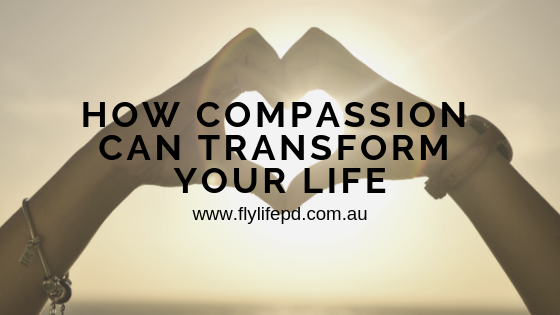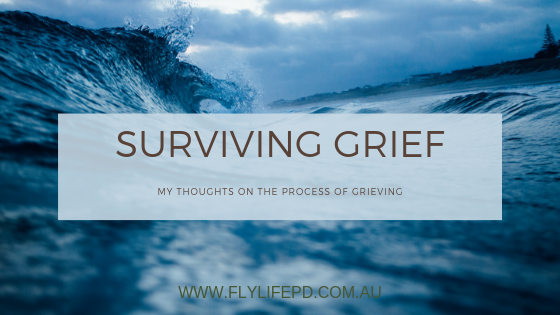Your alarm went off this morning and you cursed yourself. The abuse was endless: you stayed up too late, had that extra glass of wine, hit snooze six times already. Fool, fool, fool.

Then that jerk in the parking lot really set your day off. Of course he had to take the spot you were heading for. Bloody Katie on reception gave you her stupid bubbly “Good Morning Sunshine” greeting, which really pissed you off because it’s NOT a good morning, and “don’t call me bloody Sunshine”.
The day ain’t gonna get better from here… you end up feeling cranky and depressed all day. You stay up late watching Netflix and drinking one too many wines, because you need it after the day you’ve had.
And here we go again…
What’s compassion got to do with it?
One thing that really stuck with me when I read The Art of Happiness by the Dalai Lama, was that compassion is a major component of living a happy and peaceful life.
At the time, this took me by surprise. I had never really thought much about compassion. I guess I could be compassionate if someone was sick, or if a dog got hit by a car… but I don’t think compassion was really a key part of my life.
The Cambridge Dictionary defines compassion as, “a strong feeling of sympathy and sadness for the suffering or bad luck of others, and a wish to help them”.
I started to try being more compassionate when things were making me cranky. I was amazed… the anger that had been building would just disappear. It takes practice to make compassion your first stop, but it does become easier. And it truly makes a difference to how you approach things.
Applying compassion in different scenarios
Compassion for yourself
Firstly, self-compassion is not the same as self-indulgence. Being kind to yourself doesn’t mean you make excuses or let yourself off the hook every time. You can be gentle and kind while still acknowledging that you can do better. Look back at the Cambridge definition of compassion and take note of the last bit: compassion involves having a wish to help the person. Having compassion for yourself might mean acknowledging that you’ve had a rough day, thinking some kind and loving thoughts for yourself, and then gently encouraging yourself to make some better choices tonight which will hopefully give you a better start tomorrow. Studies have shown that people who have self-compassion also have better self-discipline.
Compassion for your family
We tend to take out our bad moods on those who are closest to us (just ask my poor husband). We spend a lot of time with our families, and sometimes they can irritate us the most.

Maybe as you’re getting older you’ve realised your parents are not the all-knowing, all-fixing, always-loving super-humans you once thought they were. Perhaps your siblings are making bad choices and you just want to smack some sense into them. It seems like your husband or partner is just trying to piss you off. And why won’t your bloody kids just stop nagging you for five freakin’ minutes?
Rather than letting your frustration build to the point that you snap at your family or distance yourself from them, try a little compassion. Consider what they’ve been through in the past that has shaped them and their current behaviour. Think about what they might be going through right now that could be tough for them. Remember all the reasons you love them, and think about how much they love you as well. Speak gently and lovingly to them. Life is short, and these are the people we would miss most if they were gone. Don’t waste precious time with them by being irritable and mean.
Compassion for the people who annoy you
There are other people in our lives who may not be family but we have to deal with them regularly. And we wish we didn’t. For example, a horrible neighbour, a drama queen workmate, or that person on your course who won’t shut up and is destroying every little hope that class might end early.
You don’t have to become friends with these people. But having compassion for them can help reduce the negative impact they have on you. Remind yourself that you don’t know this person very well, and therefore you don’t know what has shaped their personality or behaviour. Try to think some kind thoughts about them, silently wish them well, then let their annoying behaviour go.
Compassion for random strangers
It is SO easy to say or think horrible things about people we don’t know. Whether it’s someone on TV you disagree with, or an inconsiderate driver on the road, or that jerk who didn’t say thanks when you held the door open for him. I bet you’ve had moments where you’ve muttered something mean that you would never say to someone’s face.
Sure, it’s disappointing when people are inconsiderate or rude or do something careless that might put others in danger. But by losing your shit over it, you’re actually just intensifying the negative impact they’ve had on you, and possibly adding to their already-crappy day too.

I used to get really bad road rage and could end up in a horrible mood by the time I got to my destination. I’d be holding on to so much anger about the idiots on the road. Now, I try to consider that the woman who pulled out in front of me might have a screaming baby in the back and she’s desperate to get home and genuinely didn’t see me. The guy who didn’t indicate might have just suddenly realised he was about to miss his turn and probably felt bad about his moment of bad driving. The woman who is driving too slowly might be terrified of driving and is outside of her comfort zone in this suburb but is trying to be brave and help a friend out. Even if you’re making up scenarios about people, it can help you to feel more kindness toward them.
How will compassion change your life?
Trying to be more compassionate will have a positive impact on your life. It doesn’t mean that you have to take on everyone else’s problems. It’s a change in your own mindset. Sending love and kindness to people rather than anger or judgement, will help to grow positive feelings within yourself. It allows you to let go of things that annoy you.

And if you are kind, or can help someone in some way, isn’t this a positive contribution to the world? If more people were kind and compassionate, we might have less hostility, anxiety and depression. We might have better social connections and opportunities for vulnerable people. I’m not talking about world peace here… but y’know what? If everyone was more compassionate… maybe… just maybe….




[…] kind to yourself. Showing yourself some compassion and kindness will go a long way in changing your attitude and inspiring growth. Being mean to […]
Excellent post! Negative thinking really does have a ripple effective and I find on days that I am frustrated with myself, this quickly spirals out to the people around me — loved ones, my students, and strangers. So how you organized your ideas worked very well because first, compassion must begin with ourselves. Then it can spread outward to our family and then to strangers. And you are absolutely right that harboring negative energy toward the annoying coworker or the car who cut you off does absolutely nothing except to make you feel worse!